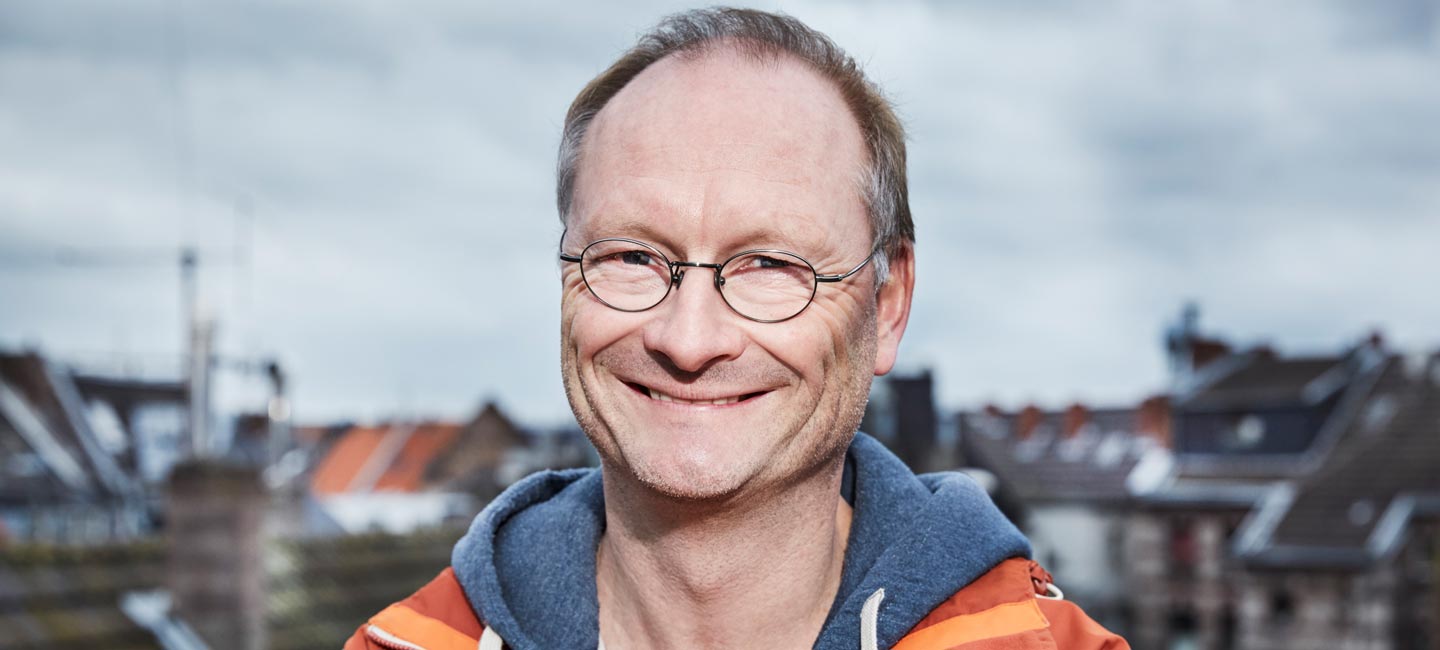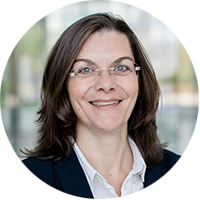There’s a storm on the horizon.
These days, the weather is playing up. Whether it’s heatwaves, dry summers, heavy rain with devastating floods or cherry blossoms in December, climate change has become very tangible. We asked Sven Plöger, weatherman and popular face on German TV, to help us connect the dots between weather and climate. He adds context to one of the most acute issues of our time, gives us an insight into the science behind it and explains the role that companies can play in putting things right.
Written by

Sven Plöger studied meteorology at the University of Cologne and has been a media meteorologist for Germany’s ARD broadcasting service for over 20 years. He’s made it his mission to translate the complexities of climate change for a general audience. He gives lectures and is the author of several popular science books on the subject of weather and climate. His book ‘Zieht euch warm an, es wird heiß!’ (which roughly translates to ‘There’s a storm on the horizon’) was a bestseller in Germany for 42 weeks.
Mr Plöger, science has known about climate change and its effects for decades, but the public at large has only picked up on it in the past four years. Why is that?
Scientists have known very well about climate change for about 40 years now. But for many, the topic was too abstract. It took events that are extreme to wake us up, like the flooding of the Ahr valley. Or the hot, droughty summers. These are things we can really ‘see’ and ‘feel’, the more they affect us, the more we open our eyes to them. You could say the atmosphere is giving us a rude awakening.
The title of your book freely translates to ‘There’s a storm on the horizon.’ Is this meant shake us awake, too?
My aim was to clear up misconceptions, raise awareness, perhaps also cause a little stir. Because it’s never too late. I think it’s a part of our responsibility to leave behind a planet that others can enjoy too. And it may sound tragic, but there’s no point glossing over it: we won’t meet the 1.5 °C Paris Agreement goal set in 2015. According to a WMO study (World Meteorological Organisation), there is a 50% chance that we will exceed this mark in 2026.
The weather defines our climate. Whether it’s raining outside, or the sun is shining or it’s very windy, that’s the weather. Climate on the other hand is when you look at weather events on a much larger scale, over a period of 30 years or more, and considering a larger area, too. If you are looking at the weather all over the world, we speak of global climate. The weather pattern during a year, for example in Germany, is what then makes up our regional climate.
What causes extreme weather?
The Arctic heats up faster than any other region in the northern hemisphere. This is leading to the ice melting faster than ever before. Ice works like a mirror for reflecting sunlight back into space, which means that less of it has massive consequences for the rest of the planet, as we are effectively reducing the size of this mirror. This regional, disproportionate amount of warming in turn leads to changes in flow patterns in the atmosphere that are there to compensate for differences, making our highs and lows last longer. An extended high leads to summers filled with droughts and heat, and if a low sticks around, we have heavy rain and flooding.
The 1.5 °C target means that we reduce the man-made global temperature increase due to greenhouse gas emissions to an average of 1.5 °C by 2100 compared to the pre-industrial era, i.e. the average temperature of the years from 1850 to 1900. So far, the temperature globally has risen by 1.2 degrees, and we can see the effects of this right now. If we go up by 2 degrees, extreme weather events or extended droughts will occur far more often, but of course still less frequently than with a rise of 3 degrees. We still have a chance of at least making the 2 degrees.
We’re not starting from scratch. 20 years ago, there was a real possibility that the atmosphere could warm up by 4, possibly even 6 degrees. Right now we’re steering towards 2.7 degrees, so that’s an improvement. But this is not enough to provide future generations a planet that they want to live on. This is why it’s time to get our act together and start consistent global action. Of course I would prefer if the global population saw more reason, but that’s not going to happen.
Climate protection has to become ingrained in the way we do things, a win-win business of sorts, so that everyone wants to join in. For this to happen, we need to evolve into an eco-social market economy, where everyone reflects on their own behaviour. I’ll give you an example. High meat consumption and the expectation that this valuable resource should be offered at discount prices fuels the deforestation of the Amazon rain forest, as these grounds are used for growing soya for fattening livestock. And this in turn could ultimately lead to the disappearance of a habitat that is as crucial for its creatures as it is for the world.
Absolutely. We as people have to realise the consequences of our actions and accept that we can’t continue living this way as it would simply eat up our wealth and prosperity. Technical advancements can help us here and there, but it’s not going to work without a change in mindset, too. Germany has a large and healthy landscape of SMEs, and when I’m invited to events I’m positively surprised at a paradigm shift that is taking place in the minds of company founders, now that many of them have grandchildren. And this is of fundamental importance, as many studies show that every euro that is not properly invested into climate protection has to be compensated for later on with two to eleven euros.
There are countless possibilities. More green areas in cities, less impervious surfaces or fewer data streams. Digitalisation requires a lot of energy. This can be a starting point—how much data do we really have to send around the globe? I’m thinking green data centres, energy-efficient devices or the meaningful use of hardware. It will take no less than a transformation in almost all areas of life, if we want to become sustainable. The opportunities are here, we just have to grasp them.
